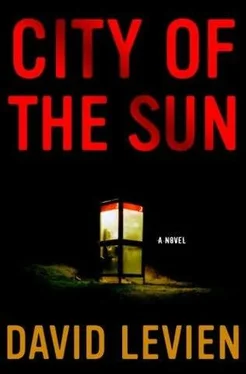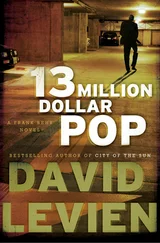David Levien - City of the Sun
Здесь есть возможность читать онлайн «David Levien - City of the Sun» весь текст электронной книги совершенно бесплатно (целиком полную версию без сокращений). В некоторых случаях можно слушать аудио, скачать через торрент в формате fb2 и присутствует краткое содержание. Жанр: Криминальный детектив, на английском языке. Описание произведения, (предисловие) а так же отзывы посетителей доступны на портале библиотеки ЛибКат.
- Название:City of the Sun
- Автор:
- Жанр:
- Год:неизвестен
- ISBN:нет данных
- Рейтинг книги:4 / 5. Голосов: 1
-
Избранное:Добавить в избранное
- Отзывы:
-
Ваша оценка:
- 80
- 1
- 2
- 3
- 4
- 5
City of the Sun: краткое содержание, описание и аннотация
Предлагаем к чтению аннотацию, описание, краткое содержание или предисловие (зависит от того, что написал сам автор книги «City of the Sun»). Если вы не нашли необходимую информацию о книге — напишите в комментариях, мы постараемся отыскать её.
City of the Sun — читать онлайн бесплатно полную книгу (весь текст) целиком
Ниже представлен текст книги, разбитый по страницам. Система сохранения места последней прочитанной страницы, позволяет с удобством читать онлайн бесплатно книгу «City of the Sun», без необходимости каждый раз заново искать на чём Вы остановились. Поставьте закладку, и сможете в любой момент перейти на страницу, на которой закончили чтение.
Интервал:
Закладка:
Silence pressed into the room again. Behr realized they ’ d reached the part of the initial interview he dreaded most. The answer to his next question would reveal whether he was near the beginning or actually closer to a resolution in the case. He had to ask the couple if they were involved in their son ’ s disappearance.
After the question had left his mouth, he would gauge them closely as they answered. There were myriad clues, both verbal and nonverbal, in people ’ s answers to direct, probing questions. Most cops with careers of any length and activity developed powerful abilities in deciding whether or not people were lying to them. For many it was merely the uncomfortable sensation that what they were being given wasn ’ t the truth. The proverbial gut feeling, so often referenced, was a reality according to Behr ’ s experience. For others, distinguishing fact from fabrication was a science.
Behr ’ s approach fell somewhere in between. He had good instincts, but that hadn ’ t satisfied him. After his second year on the force he ’ d gone to San Francisco on his own dime for a three-day seminar given by an ex-CIA interrogator called Tactical Behavior Assessment and Strategic Interviewing Techniques. His wife hadn ’ t appreciated it, as his dime was actually several thousand dollars that they couldn ’ t afford. It was there that Behr had learned the skills that he would hone over the years. Skills that had helped him make a living ever since. He wouldn ’ t say he was a human lie detector, nothing like the ex-spook who had given the course, but he ’ d developed a hell of a sniffer. Once he got a hit of deception, he had the tools to run down the truth.
Behr cleared his throat and asked his question. “Did either of you have anything to do with Jamie ’ s disappearance?” He glanced from husband to wife, prepared for tics or protests or answers that were geared to convince him of their innocence rather than just convey information.
“No,” said the father. The mother just shook her head, wept, and then uttered an “Uh-uh” sound.
Behr believed them. He had an inestimably larger amount of work in front of him now. Nonetheless, he felt relief. Later, when he got home, he ’ d go on the Internet and comb through financial databases. He ’ d check the family ’ s assets and TRWs to make sure there were no irregularities, no large withdrawals indicating a gambling or drug problem that could ’ ve provoked a hideous crime.
“If it ’ s all right, I ’ ll look at his room,” he said.
They all stood.
Behr entered the room and paused before turning on the light. Paul and Carol were positioned down the hallway several yards back, afraid to come any closer. Behr slid his hand along the wall and clicked on the light. What he saw hit him low in the gut. He kept his hand against the wall, steadying himself for a long moment. The room belonged to a well-cared-for American boy. A single bed covered by an NFL comforter was built into a tan Formica headboard and nightstand. There were wrapped gifts on the bed, birthday and Christmas presents for a son who wasn ’ t around to collect them. Two posters dominated the room: Albert Pujols turning on a ball and a red Ferrari F430 Spider. Both were matted on posterboard. A ten-by-twelve photo of a large African American bicycle racer had been torn from a magazine and tacked to the wall near the bed. A basic Compaq desktop computer sat idle on a small desk in a litter of school notebooks. They were next to a large cup from Pizza Pizzazz filled with coins and an old Reggie Miller bobble-head doll. Several Harry Potter books rested on bookshelves next to fairly neatly glued-together plastic model F-15s and battleships.
He turned and opened the closet, pulling a string that switched a light on inside. Jeans hung on hangers next to button-down shirts and several jackets of different weights. A small dark suit was all the way to the left. Along the floor were basketball sneakers, soccer cleats, scuffed penny loafers, Teva sandals, and a pair of winter boots. Behr pulled the light cord and swung the closet shut. He turned to a small dresser, forcing himself to go on. The dresser held T-shirts, socks, underwear. The bottom drawer housed folded dress shirts and two neckties. Beneath them, secreted, was a folded magazine photo of a full-breasted young blond singer wearing a brassiere top and a microphone that fit over her head like an air-traffic controller ’ s mouthpiece. She was covered in sweat and projected sex, youth, and innocence. There were also three packs of Black Cat firecrackers, but no scribbled notes or other information.
Some light dust was under the bed, Behr saw, his mini Maglite slowly sweeping over it as if it were a lunar surface. There was a small boom box and some pop CDs. Eminem, Green Day, Korn, a strange three-course meal. Between the mattress and box spring he discovered a treasure, a Cal Ripken baseball card from his rookie season tucked inside a plastic sleeve. Finding nothing else, he tried to smooth out the bedding the way it had been.
Behr sat on the small desk chair, testing its strength, and flipped quickly through the schoolbooks on the desk. The notebooks were marked “Return to Jamie Gabriel — Room 102, Johnny Fricking Kennedy Middle School.” Behr pulled at his chin and looked through them. School exercises, personal notes, top-ten lists organizing and reorganizing the best professional athletes in each of their sports and combining them across sports. Kobe Bryant dueled with Dwayne Wade and Derek Jeter; Behr half smiled at Peyton Manning being crossed out two times and moved right to the top, and at what was written in for tenth place: “Tiger Wood.” There was nothing to indicate the boy had met anybody new or had plans to meet someone at the time of his disappearance.
He turned on the computer and searched through documents, which were school papers on plankton, Paul Revere, and the like. He checked the scrap of paper that the parents had given him and signed on to America Online to review Jamie ’ s account. He found nothing beyond kidlike screen names in the boy ’ s e-mail address book. His favorite places list was made up of movie, music, sports, and car sites. Behr didn ’ t find any links to strange, or borderline, Web sites. Besides spam, there were no e-mails new, old, or to be sent, as they had been automatically deleted by the server long ago after so much inactivity. He made a note to himself to try to get access to the service provider archives. Behr signed off, shut down the computer, and sat back. He rubbed his face with his hand and stood.
Carol and Paul still waited in the hall. They ’ d been standing there, frozen, for the whole forty minutes Behr had been in the boy ’ s room. As he walked out, they looked up at him, childlike in their anticipation. Behr shook his head and wrote a note in his notebook. They stood uncomfortably for a moment in the close quarters of the hallway.
“Mr. Behr…Frank…” Carol finally said, her voice low but direct in the tortured air of the hall. “I want to explain how we felt…how we feel about our son. How we love him…” Time and her pain couldn ’ t completely hide her prettiness, Behr noticed, and when she stopped, unable to go on, he felt the urge to help her.
“No need, ma ’ am,” he began, his voice low and rough. He went on despite himself. “I understand a bit of what you ’ re going through, having lost a son of my own. He died when he was seven.”
EIGHT
Behr climbed into his Toronado and turned it over. The engine woke up hoarse then leveled. He drove away from the Gabriel house, surprised at himself for mentioning Tim to this couple he ’ d only known for a few minutes, his employers. He hadn ’ t gone into detail when they pursued it, but still, he had brought him up. And now, in the car, he found himself thinking about the events leading up to Tim ’ s death, trying for the thousandth time to untangle the knot they ’ d become.
Читать дальшеИнтервал:
Закладка:
Похожие книги на «City of the Sun»
Представляем Вашему вниманию похожие книги на «City of the Sun» списком для выбора. Мы отобрали схожую по названию и смыслу литературу в надежде предоставить читателям больше вариантов отыскать новые, интересные, ещё непрочитанные произведения.
Обсуждение, отзывы о книге «City of the Sun» и просто собственные мнения читателей. Оставьте ваши комментарии, напишите, что Вы думаете о произведении, его смысле или главных героях. Укажите что конкретно понравилось, а что нет, и почему Вы так считаете.












